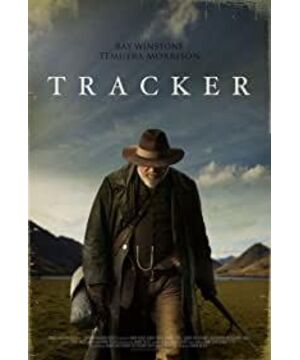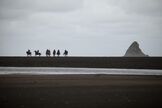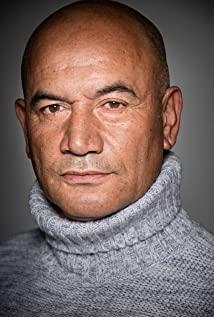2015.03.15
The story takes place in 1903. In the Anglo-Boers War between Britain and South Africa that just ended, Aryan Van Diemen (Ray Winstone) was a famous South African guerrilla who defended his homeland. Van Diemen, a farmer, killed many British officers and escaped the British many times. Now the South African Boer Van Diemen, along with the soldiers who returned home after the Anglo-Boer War, took a ship to New Zealand, a former hostile country, the British colony to find a way out.
Major Carlisle of the British Army stationed in New Zealand is quite a gentleman. Although he is a soldier, he respects his opponents, obeys the rule of law procedures, and abides by his duties. When he saw the name of Van Diemen from the passenger list, he was shocked and disbelieving, and immediately sent a messenger to the pier to greet the legendary man who had been admired for a long time but had never met. The sergeant was stopped by the sergeant on the way to the dock. Sergeant Sanders was a rude, rude, racially discriminatory, and violent scum in the army. When he learned that the major wanted to see Van Diemen, the sergeant immediately rushed with the sergeant. to the pier. At this time, Fan Dimen was being interrogated by customs officers. When the customs officers asked him why he came, Fan Dimen only answered two words: Curious! When the customs officer further asked him what curiosity drove him to travel thousands of miles, Van Diemen asked solemnly: "I am really curious, I want to understand why you have to travel thousands of miles to help the British burn down my farm. At this moment, the sergeant-major arrived, took Van Diemen's passport, and pointed his gun at him. Van Diemen said very calmly: I thought the war was over, and the sergeant-major replied: To you It's not over yet, you bastard, you were arrested, and then, the ordering soldiers took off Van Diemen's gun. When the major saw Fan Dimen who was being escorted, he was so angry that he ordered the sergeant major to immediately put the gun out. Return it to Van Diemen, and yelled at the sergeant major: "Quick, you idiot, don't force me to write a report to punish you. "Faced with the sternness and threats of the major, the sergeant had to withdraw his gun and leave. The major ordered the messengers to return to the dock immediately, and gave a heroic welcome to the real soldiers. The major expressed to Van Diemen the reckless behavior of his subordinates. He apologized and further explained that he and the sergeant major had both spent time in South Africa, hoping to get Van Diemen's understanding. After Van Diemen was seated, the major sighed and said: It seems that you really have a person like you. It took me almost two years. , leading a cavalry team to try to catch you..., Fan Dimen interrupted the major's work, and said sarcastically: And your major, you can't even catch a poor farmer? The major changed the topic awkwardly. , asked him what plans to come here away from home? Van Diemen aggressively asked the major: You are also far away from home. The major replied arrogantly: No, this is my home now. This sentence attracted Van Dimen more Sharp sarcasm: Home? Now it seems that most of the world is your British home! The major was once again embarrassed, but he was a little unwilling, and asked Van Diemen if he planned to sell a piece of land here, and then when Back to the farmer? The major seemed to have remembered something, and continued: Uh, I don’t think we left anything for you... The major’s remarks angered Fan Dimen. Facing Fan Dimen’s glaring eyes, he remained silent. The major realizes his repeated loss He said in a perfunctory manner: I hope you can find what you are looking for here. Van Diemen stared at the major, put on his felt hat, and got up and left indifferently.
In the stables of the British army barracks, a New Zealand indigenous Maori and a Caucasian woman just finished making out, just happened to be found by a drunk sergeant and two subordinates and blocked on the spot, the racist British can not tolerate a savage Maori and Caucasian women have sex, so find fault with this Maori. At first, the Maori did not fight back, they were beaten blindly, and finally the Maori were provoked and rose up to resist. No, the sergeant-major mistakenly killed his brother during the fight, and the Maori also took the opportunity to escape. After sobering up, the sergeant major and another subordinate defended themselves, accusing the Maori of killing the soldier and forcing the prostitute to give perjury. After questioning, the major learned that the Maori was a harpooner who got off a whaling ship the day before, and that the whaling ship had left before the low tide that afternoon, and invited Van Diemen to hunt down the Maori and offered a reward for their capture. £100, £25 dead. At the same time, the sergeant major and his subordinates were justly refused to participate in the tracking on the grounds that the parties were not qualified.
The injured Maori ran along the coast all night, found someone following, and left the sea into the mountains. Not long after, the major led Fan Dimen and a group of six to follow them on horseback under the guidance of a local hunter. The local hunter found a line of footprints along the coast. According to the weight of the footprints on the toes, it was concluded that there were no heel prints. It is a Maori, and according to the depth of the footprints and the pace, the weight and height are determined to be consistent with the criminal, and he infers that the criminal intends to find an opportunity to get a boat to escape before catching him, and then proposes to the major to continue to track north along the coast. At this time, Van Dimen, who has been silent for a long time, put forward his own different opinions on the footprints based on the bloody leaves he found: the person we are looking for is a person who has been wearing shoes for a long time, while the footprints are a person who has never worn shoes. Left by the man who had passed the shoes, and from this we can judge that the man we were looking for was not only a seaman, but he had also returned home. After finishing speaking, Fan Dimen abandoned his horse and chased towards the mountain by himself. Looking at Fan Dimen who was getting away, the major decided to follow the advice of the local hunter and continue to follow along the coast.
New Zealand is a mountainous country with picturesque scenery. In the picturesque mountains and mountains, a game of cat and mouse officially kicked off. Between the Boers and the Maori began a crazy game that runs through the entire New Zealand continent. Wild tracking. It's a battle of wits and survivability, and tracking is a laborious chore for both parties. The escapee had to do everything possible to find the way and to cover up the traces of their passing, while the stalker did not dare to relax for a moment, for fear of losing someone. For Van Diemen, a Boer who has been on the battlefield for many years and is good at tracking, it is a familiar thing, but he did not expect that the Maori also have great wilderness survival skills. The chase becomes thrilling, dangerous, and fun. At first, the Maori underestimated the opponent's tracking ability, and the Boers quickly saw through his disguise, and the Maori had to capture it. Immediately afterwards, the Boers were subdued by the Maori because they underestimated the enemy. Unexpectedly, an inattentive Maori was tricked by the cunning Boers. In a hurry, the Maori resorted to a dangerous move and escaped again. The duel between the two wild survival masters made this chase and fight. The climax after another, full of fun. At this point of the story, many people think that this is a film showing scenery and fighting. In fact, the picturesque scenery of New Zealand and the plot of cat and mouse are only part of the film. The biggest highlight of the film is the profound ideological connotation. The two of them reversed several times in a row, turned the corner, and in the game of survival, they gradually understood each other's present and past, and the Boers knew the hatred between the Maori and the white people from Europe. Also know the misfortune brought by the British to the Boers. Through further communication, we have a deeper understanding of each other's inner world. The memory of the Maori's grandfather and father being strangled by the British colonists made him doubt whether he could get a fair trial after being arrested, tried to escape, and in the end would rather die than die. Willing to be brought to stand trial, because he is convinced that all that is left to him is to be hanged, to step on the doom of the elders, so that the soul has nowhere to turn to. In the dialogue with the Maori, we also saw the inner contradiction of the Boers: whether to participate in the tracking for the sake of upholding the law or for the bounty, or whether to release the Maori for substantive justice or capture the Maori for procedural justice. The Maori recall the words of their hanged father: Fight for freedom. However, he said he fled without taking up the responsibilities entrusted to him by his father. Boers say: Fight for freedom? We went out to fight the British just so that my neighbours could continue to strangle Hottentots like my servants, just because they were different races? It might be a hundred South Africa and New Zealand, which were in a transition period a few years ago, were diverse, confusing, and confusing. The old is far from leaving, and the new is coming little by little. Aboriginal Māori have been slowly integrating into modern life after generations of struggle. When Van Diemen was reciting the Bible, the Maori told him that he, too, had attended mission school. The homeland was burned down by the British army, his old servant Hottentot was hanged by his neighbors, his family was imprisoned in a concentration camp and died for no reason, and his family was destroyed by the British army. Came for revenge. Yet in the face of his enemy and adversary, the Major, the two sides were able to pursue a reconciliation without retaliation shortly after the war. A man from thousands of miles away, whose homeland in South Africa was ravaged, a barbarian descendant who was close at hand and whose homeland was also taken away, and the relatives of the two men who were also brutally bloodbathed by the British army. They have a lot in common besides hating the Brits. The relationship between the two people gradually changed from mutual hostility to mutual respect, and even sympathy for each other. In the last fight, the two rolled down the hillside, and the Maori had a chance to kill Van Dimen, but couldn't. At this time, the major who was chasing the wrong direction led the soldiers to turn back and catch up, and everyone caught the Maori. At this time, Van Diemen had concluded that the Maori were not the murderers, and at the same time had a premonition that there would not be a so-called fair trial as the military said after the Maori were captured. So Van Diemen looked for an opportunity to help the Maori escape. People are not murderers, and at the same time, I have a premonition that there will be no so-called fair trial that the military said after the Maori are captured. So Van Diemen looked for an opportunity to help the Maori escape. People are not murderers, and at the same time, I have a premonition that there will be no so-called fair trial that the military said after the Maori are captured. So Van Diemen looked for an opportunity to help the Maori escape.
Fan Dimen did not leave with the chasing soldiers, but chose to continue to help the Maori. And accompany him to the sacred place of the Maori, the guardian of the sacred cave. At this time, the Maori entered the cave and began to seek spiritual help from ancestors and gods. When the pursuers approached again, the Maori knew that if they were caught back, they would die. He didn't want to be hanged from a tree stump by a white man like his ancestors. Van Diemen handed his pistol to the Maori and wanted to fight with him. The Maori asked Van Diemen that they would rather die at his hands and hope for a decent funeral in the future. He took off his shirt, held the barrel of the gun, and sang loudly and solemnly in Maori.
When the pursuers heard gunfire, the Maori were crawling in the pool under the waterfall when they arrived. Fan Dimen gave the major a wrapped red cloth, opened it and saw that it was a finger. This is how Van Diemen treats heroic enemies, giving them dignity. Fan Diemen stopped the sergeant major's attempt to cut off the Maori head by force, and solemnly asked the major to take the Maori body back and bury it properly. The major refused on the grounds that he did not want to waste time on it.
The major who led the pursuers back to the camp saw his subordinates put their heads directly under the open water faucet, and thought of seeing the Maori's head under a small waterfall at last. Died, but was just cut off by Van Diemen's finger, Lemon passed the level. All nearby ports and whaling ships are searched for Māori missing a finger with emergency orders.
At the end of the film, the major came to the beach on horseback, found Fan Dimen who was waiting for the boat, and asked him why he was leaving again. Fan Dimen calmly replied: This country does not interest me. The major pointed out that Fan Dimen was going to Australia, and Fan Dimen answered: "There is a place called Fan Dimen's Land, which sounds very good." He tried to dispel the major's doubts. The major asked again: You left without the bonus? Without waiting for Van Diemen to answer, he took out the gold pound and threw it to him, and said regretfully: Twenty gold pounds should have been four times as much. Reluctantly, the major pressed on again: "He's still alive, isn't he? Must be like you were before, you didn't even shout when you chopped off his fingers, I think you must have your reasons, and I may never understand. At this moment, Van Diemen straightened up and said: "There are many reasons." Then he turned the conversation, looked directly at the major and asked: "Did you present and gave the order when my farm was burned down?" He got a negative answer Then he pressed further: "When you burned down the house, was there anyone else at home?" After receiving the affirmative answer of "No, I can assure you" from the major, Fan Dimen's tense face was relieved. . When Van Diemen was about to board the ship, the major vowed again: "I informed every port, whaling station, you gave him at most a few weeks or even a few days, and I sincerely hope that it is worthwhile for you to do so. ." Van Diemen, who had already boarded the boat, replied meaningfully: "You know what? What does a few days of life mean to a person who has been convicted?" go with……
Father Fan Dimen sat on the boat, holding a pipe in his right hand wrapped in gauze, and took a light puff. With his left hand he took out a pocket watch with pictures of his wife and daughter, and a few old tears fell down.
Of course, the major would not find a Maori with a broken finger, because that broken finger belonged to Dad Fan Diemen. This unexpected ending adds to the brilliance of the film.
View more about Tracker reviews











